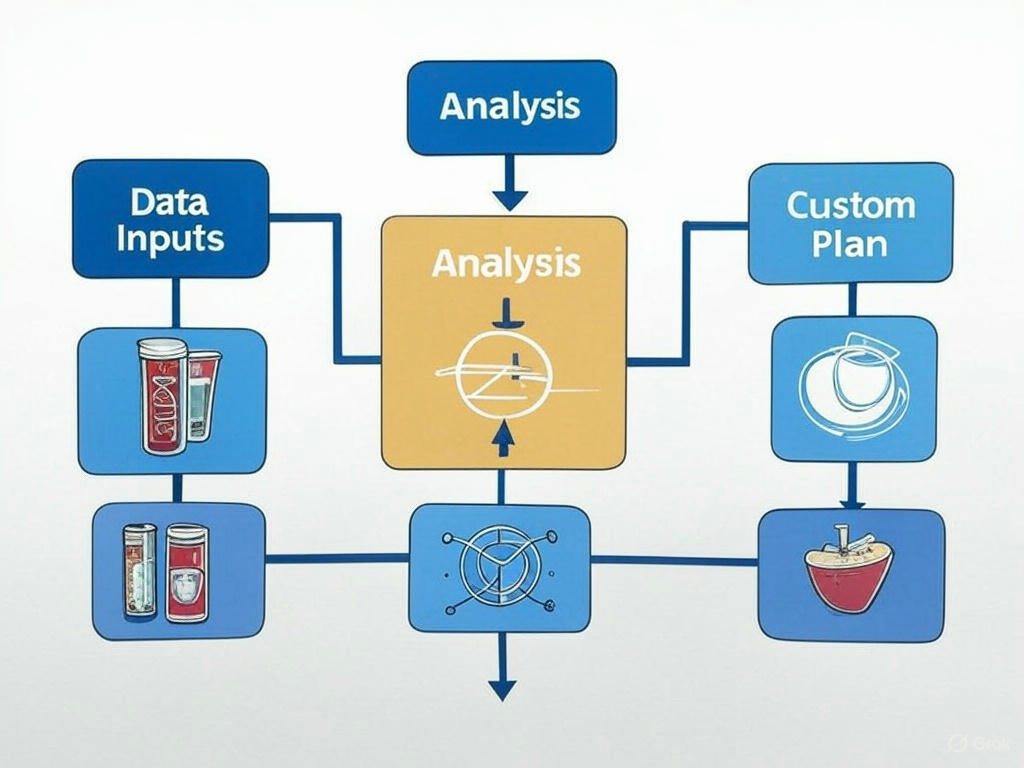Introduction: What is Personalized Nutrition? 🧬
Personalized nutrition is the practice of tailoring dietary recommendations to an individual’s unique biological makeup, lifestyle, and goals. Unlike traditional diets that assume everyone’s needs are the same, this approach says, “Hey, you’re one-of-a-kind—your nutrition should be too!” It’s rooted in the idea that our bodies respond differently to food based on genetics, gut health, activity levels, and even our daily habits.
Think of it as a nutritionist with a PhD in you. By leveraging cutting-edge science, personalized nutrition promises to optimize your health in ways generic plans never could. Curious how it works? Let’s break it down. 👇
Section 1: Genetic and Lifestyle Factors 🌱
Why does your friend thrive on a high-protein diet while you feel sluggish on the same plan? The answer lies in two key players: genetics and lifestyle.
Genetics: Your Body’s Instruction Manual
Your DNA isn’t just a cool double helix—it’s a roadmap to how your body processes food. For example:
- Some people have a gene variant that makes them metabolize caffeine slowly ☕, meaning too much coffee could leave them jittery for hours.
- Others might carry a version of the FTO gene linked to fat storage, influencing how easily they gain or lose weight.
Research, like this study on nutrigenomics, shows how genetic testing can pinpoint these quirks, allowing diets to be tailored with precision.
Lifestyle: The Daily Difference
Genes are only half the story. Your habits—sleep, stress, exercise—also shape how food affects you. A night owl who exercises irregularly might need more antioxidants to combat inflammation, while a marathon runner could require extra carbs for energy. 🏃♂️ Add in factors like age, allergies, or even your gut microbiome (those trillions of tiny bacteria in your belly), and you’ve got a recipe that’s uniquely yours.
Section 2: How Data Drives Recommendations 📊
So, how do we turn this info into a diet that works? Enter data—the fuel behind personalized nutrition.
Step 1: Collecting the Clues
It starts with gathering intel:
- Genetic tests (like a cheek swab) reveal your DNA’s secrets.
- Blood tests measure nutrient levels, cholesterol, or inflammation markers.
- Wearables track sleep, activity, and heart rate.
- Food logs show what you’re already eating.
Step 2: Crunching the Numbers
Next, algorithms—think of them as super-smart nutrition detectives—analyze this data. They cross-reference your profile with scientific studies to suggest what’s best. For instance, if your gut microbiome lacks diversity, you might get a recommendation for more fermented foods like kimchi or yogurt. 🥗
Step 3: Fine-Tuning
The best part? It’s not static. As your body changes (hello, new workout routine!), the plan evolves with real-time feedback. This case study from the Mayo Clinic highlights how data-driven diets adapt over time.

Section 3: Benefits for Health Outcomes 🌟
Why bother with all this personalization? Because the payoffs are huge.
1. Precision Health
Generic diets might help, but tailored plans hit the bullseye. Studies show personalized nutrition can lower blood sugar more effectively than standard advice (source). That’s a win for managing diabetes or preventing it altogether.
2. Longevity
By optimizing nutrient intake, you’re not just surviving—you’re thriving. Think reduced inflammation, better heart health, and a sharper mind as you age. 🧠
3. Weight Management
Forget yo-yo dieting. Personalized plans align with your body’s needs, making weight loss sustainable. One study found participants on tailored diets lost 33% more weight than those on generic ones.
4. Gut Happiness
Your gut microbiome loves variety. A custom diet keeps it balanced, which means better digestion, mood, and immunity. Who knew sauerkraut could be a mood-lifter? 😊
Conclusion: The Future of Diet Planning 🚀
The science of personalized nutrition is clear: one-size-fits-all diets are yesterday’s news. By blending genetics, lifestyle, and data, we’re unlocking a future where food isn’t just fuel—it’s medicine tailored to you. As technology advances (think AI nutrition coaches or at-home DNA kits), this approach will only get smarter and more accessible.
So, what’s next? Maybe it’s time to ditch the fad diets and explore what your body needs. The future of eating well isn’t about following the crowd—it’s about following the science. Ready to take the plunge? Your perfect plate is waiting. 🍽️
